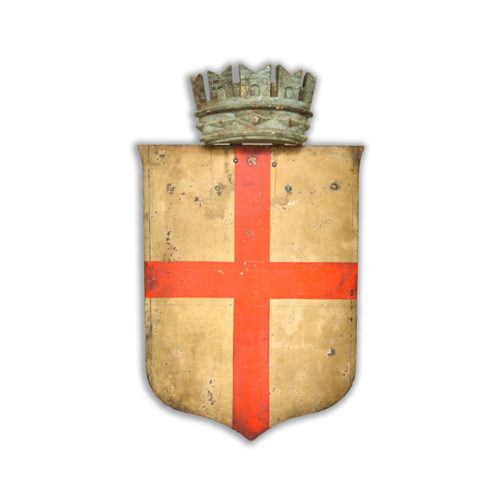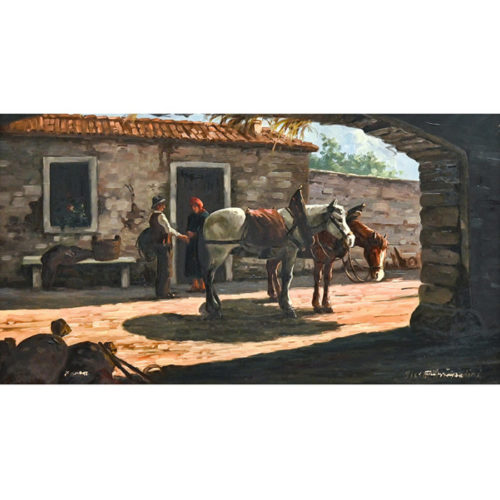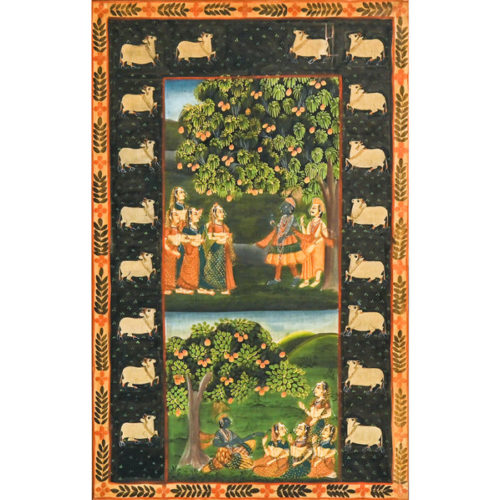-
Out of stock
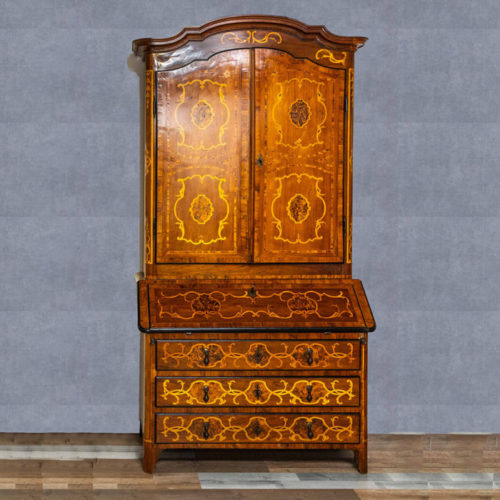 Mid-eighteenth-century Louis XV Piedmontese trumeau, in walnut with maple scrollwork inlays. Excellent condition, some inlays have been replaced with rice paste. Period: Half 700 Measurements: H 250 x W 131 x D 61.5 cm
Mid-eighteenth-century Louis XV Piedmontese trumeau, in walnut with maple scrollwork inlays. Excellent condition, some inlays have been replaced with rice paste. Period: Half 700 Measurements: H 250 x W 131 x D 61.5 cm -
Out of stock
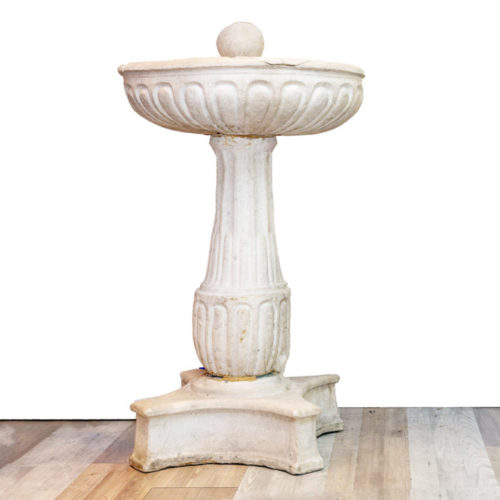 Ancient stoup in carved white marble, 17th century in good condition. Period: '600 Measurements: H 130 x D 64 cm
Ancient stoup in carved white marble, 17th century in good condition. Period: '600 Measurements: H 130 x D 64 cm -
Out of stock
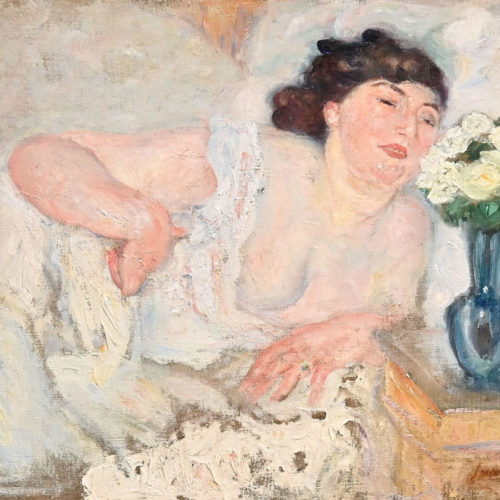 "Woman lying with blue vase" by Armando Spadini, oil on canvas signed on the lower right and dated 1902 on the back. The painting, although in excellent condition, needs cleaning. Armando Spadini (Poggio Caiano 1883 - Rome 1925) studied at the Institute of Fine Arts in Florence for a short time, visiting museums and exhibitions on his own, and assimilating, with his sensitivity, the joyfullness of colours, which is expressed personally, but not too far from the Venetian and French painters. Precisely this great love for the festive colours, for the transparent clarity, for the solar luminosity is showed in all his works, without the tormenting research that often characterized the work of the Impressionists. He is a painter superior to his time, to his environment; Emilio Cecchi considers him, like Antonio Mancini, the strongest pictorial temperament that arose in Italy after the end of the 18th century. Having won the competition for national retirement for painting in Florence in 1910, he settled in Rome, where he remained until his death, keeping on painting. He participated, but not so often, in various Roman and Florentine exhibitions, and in 1918 he held a solo show at the Casina Valadier in Rome. In 1924 at the Venice Biennale he had a room, where only his works had been displayed. Many of his works are in public and private galleries in Italy, in Paris, in Buenos Aires, in Lima. At the VI Quadriennale in Rome, in 1952, a commemorative exhibition took place with eighteen works. His works were also present at the 1956 edition of the same event. Period: 1902 Measurements: In frame H 80 x W 94 x D 12 / Canvas H 53.5 x W 70.5 cm
"Woman lying with blue vase" by Armando Spadini, oil on canvas signed on the lower right and dated 1902 on the back. The painting, although in excellent condition, needs cleaning. Armando Spadini (Poggio Caiano 1883 - Rome 1925) studied at the Institute of Fine Arts in Florence for a short time, visiting museums and exhibitions on his own, and assimilating, with his sensitivity, the joyfullness of colours, which is expressed personally, but not too far from the Venetian and French painters. Precisely this great love for the festive colours, for the transparent clarity, for the solar luminosity is showed in all his works, without the tormenting research that often characterized the work of the Impressionists. He is a painter superior to his time, to his environment; Emilio Cecchi considers him, like Antonio Mancini, the strongest pictorial temperament that arose in Italy after the end of the 18th century. Having won the competition for national retirement for painting in Florence in 1910, he settled in Rome, where he remained until his death, keeping on painting. He participated, but not so often, in various Roman and Florentine exhibitions, and in 1918 he held a solo show at the Casina Valadier in Rome. In 1924 at the Venice Biennale he had a room, where only his works had been displayed. Many of his works are in public and private galleries in Italy, in Paris, in Buenos Aires, in Lima. At the VI Quadriennale in Rome, in 1952, a commemorative exhibition took place with eighteen works. His works were also present at the 1956 edition of the same event. Period: 1902 Measurements: In frame H 80 x W 94 x D 12 / Canvas H 53.5 x W 70.5 cm -
Out of stock
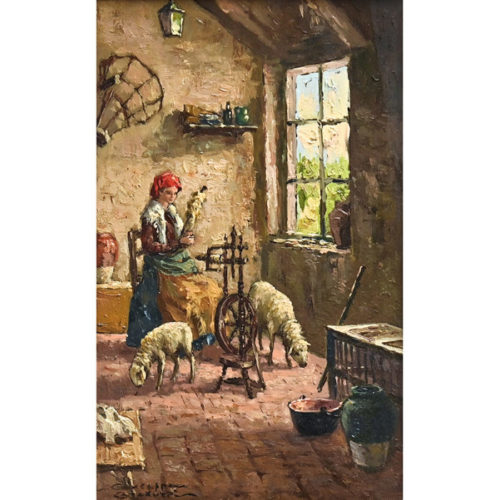 "Interior with thread spinner and sheep". Oil on tablet by Giuseppe Gheduzzi . The artist was born in Crespellano (BO) on 12 May 1889. Son of the painter Ugo, from whom he learned, like his brothers Cesare, Mario and Augusto, the first rudiments of art. He made his debut in Vignola in 1907 with the painting Alpine landscape. He refined his training in Turin at the Albertina Academy as a pupil of Andrea Marchisio and Paolo Gaidano. After leaving the Academy, he collaborates with his father for the realization of the stage sets for the Teatro Regio. Giuseppe is a skilled landscape painter: he paints Venetian glimpses and panoramas, views of the Piedmontese lakes and valleys and of the Ligurian Riviera. Unlike his brother Cesare, however, he also excels in interior paintings with figures and orientalist themes. Particularly appreciated by the public and critics are in fact his genre scenes and the paintings depicting interiors of workshops of artisans, antique dealers and stables. During his life Giuseppe participated in many reviews of the Promoter of Fine Arts in Turin and in the Circolo degli Artisti in Turin, and made several personal exhibitions. He died in Turin on May 21, 1957. Period: 1930s Measurements: In frame H 36 x W 28 x D 3 / Canvas H 20 x W 11,5 cm
"Interior with thread spinner and sheep". Oil on tablet by Giuseppe Gheduzzi . The artist was born in Crespellano (BO) on 12 May 1889. Son of the painter Ugo, from whom he learned, like his brothers Cesare, Mario and Augusto, the first rudiments of art. He made his debut in Vignola in 1907 with the painting Alpine landscape. He refined his training in Turin at the Albertina Academy as a pupil of Andrea Marchisio and Paolo Gaidano. After leaving the Academy, he collaborates with his father for the realization of the stage sets for the Teatro Regio. Giuseppe is a skilled landscape painter: he paints Venetian glimpses and panoramas, views of the Piedmontese lakes and valleys and of the Ligurian Riviera. Unlike his brother Cesare, however, he also excels in interior paintings with figures and orientalist themes. Particularly appreciated by the public and critics are in fact his genre scenes and the paintings depicting interiors of workshops of artisans, antique dealers and stables. During his life Giuseppe participated in many reviews of the Promoter of Fine Arts in Turin and in the Circolo degli Artisti in Turin, and made several personal exhibitions. He died in Turin on May 21, 1957. Period: 1930s Measurements: In frame H 36 x W 28 x D 3 / Canvas H 20 x W 11,5 cm -
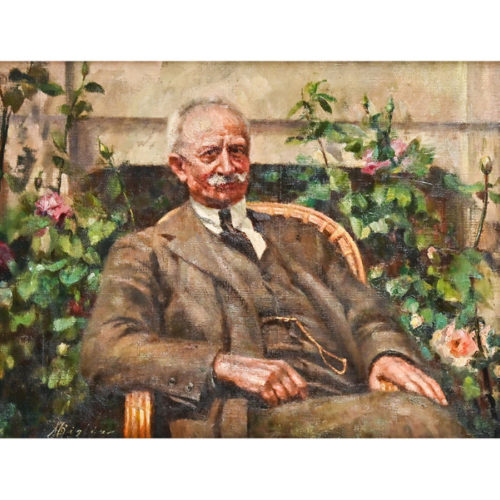 Large portrait oil on canvas, attributed to the painter Paolo Ghiglia (1905-1979), signed on the lower left, 1940s / 1950s. Paulo Ghiglia (Florence, March 5, 1905 - Rome, November 19, 1979) was an Italian painter. He starts painting very young with his father and teacher Oscar; at the age of twenty he leaves his father's house and moves to La Verna, where he lives for about five years. He made his debut in Milan in 1929 at the Pesaro Gallery with his father Oscar and his brother Valentino, also a painter. In 1931 he was at the first Quadriennale in Rome: thanks to Petrolini, his close friend, he was introduced to the capital city life and society, where his portraits period began. He stays in Paris where he portrays Joséphine Baker. He goes back to Rome, city that together with Florence, Livorno and La Verna, will be and remain the places and sources of greatest inspiration. In the forties and fifties his production focuses on portraits of illustrious people. His works can be found in various museums around the world, from the Uffizi, with two self-portraits, kept at the Metropolitan Museum of Art. Measurements: In frame H 80 x W 100 x D 10 / Canvas H 68 x W 87 cm
Large portrait oil on canvas, attributed to the painter Paolo Ghiglia (1905-1979), signed on the lower left, 1940s / 1950s. Paulo Ghiglia (Florence, March 5, 1905 - Rome, November 19, 1979) was an Italian painter. He starts painting very young with his father and teacher Oscar; at the age of twenty he leaves his father's house and moves to La Verna, where he lives for about five years. He made his debut in Milan in 1929 at the Pesaro Gallery with his father Oscar and his brother Valentino, also a painter. In 1931 he was at the first Quadriennale in Rome: thanks to Petrolini, his close friend, he was introduced to the capital city life and society, where his portraits period began. He stays in Paris where he portrays Joséphine Baker. He goes back to Rome, city that together with Florence, Livorno and La Verna, will be and remain the places and sources of greatest inspiration. In the forties and fifties his production focuses on portraits of illustrious people. His works can be found in various museums around the world, from the Uffizi, with two self-portraits, kept at the Metropolitan Museum of Art. Measurements: In frame H 80 x W 100 x D 10 / Canvas H 68 x W 87 cm -
Out of stock
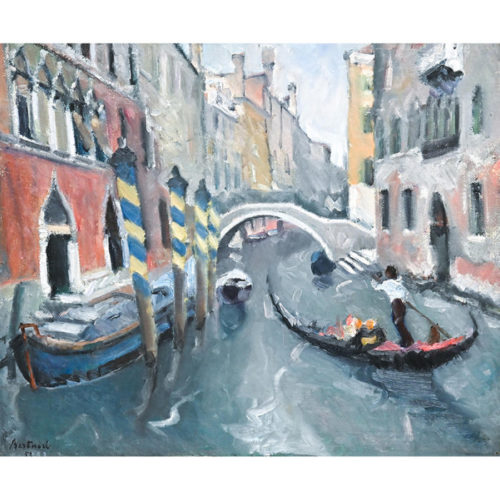 "Rio a Venezia (River in Venice)", 1953, oil on canvas by G. Bertulli. Born on August 16th, 1903 in Bardi (Parma), he lives in Milan. He studied in Piacenza, a pupil of Francesco Ghittoni, and in Milan, at the Brera academy, he then moved and settled in Milan and since then he participated in important local and national exhibitions, obtaining awards and prizes. To his credit about thirty solo exhibitions, of which six are in Milan and the last one (1967) at the Sagittario gallery. He was a member of the Accademia Clementina and the Parma Academy of Fine Arts. Trade union manager and member of the Commission for the Monumental at the Municipality of Milan. Dimensions: In frame H 68 x W 78 x D 5.5 / H 50 x L 60 cm
"Rio a Venezia (River in Venice)", 1953, oil on canvas by G. Bertulli. Born on August 16th, 1903 in Bardi (Parma), he lives in Milan. He studied in Piacenza, a pupil of Francesco Ghittoni, and in Milan, at the Brera academy, he then moved and settled in Milan and since then he participated in important local and national exhibitions, obtaining awards and prizes. To his credit about thirty solo exhibitions, of which six are in Milan and the last one (1967) at the Sagittario gallery. He was a member of the Accademia Clementina and the Parma Academy of Fine Arts. Trade union manager and member of the Commission for the Monumental at the Municipality of Milan. Dimensions: In frame H 68 x W 78 x D 5.5 / H 50 x L 60 cm -
Out of stock
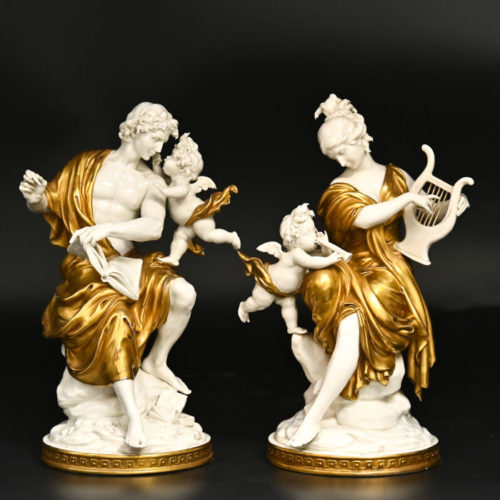 Pair of ceramics depicting the allegory of poetry and allegory of music, by Giuseppe CAPPÈ (1921-2008), ca. 1950s, in perfect condition. Giuseppè Cappè was born in Milan in 1921, he lived in Milan and later in Lomagna (Lecco) where in his studio, near the porcelain manufacturer, he created his works appreciated all over the world and which, especially in America, have conquered the market. Part of his works are now in many private collections and museums. Cappè was an artist who drew inspiration from the strands of the great Italian Baroque-Alexandrian folk tradition of which the stuccos of Serpotta (Palermo), the Capodimonte porcelain and the Neapolitan mangers are the most typical and well-known examples. Cappè was an artist who has been making sculptures since 1946 and his creations have been so successful that they have been imitated and plagiarized. He also worked as a chief sculptor at the IPA studio and later as a chief sculptor at King. Many of his models are still reproduced from these porcelain studies. He died in Lomagna on 7 May 2008. Measurements: (H 23 X L14 X P10), (H23 X L14 X P12)
Pair of ceramics depicting the allegory of poetry and allegory of music, by Giuseppe CAPPÈ (1921-2008), ca. 1950s, in perfect condition. Giuseppè Cappè was born in Milan in 1921, he lived in Milan and later in Lomagna (Lecco) where in his studio, near the porcelain manufacturer, he created his works appreciated all over the world and which, especially in America, have conquered the market. Part of his works are now in many private collections and museums. Cappè was an artist who drew inspiration from the strands of the great Italian Baroque-Alexandrian folk tradition of which the stuccos of Serpotta (Palermo), the Capodimonte porcelain and the Neapolitan mangers are the most typical and well-known examples. Cappè was an artist who has been making sculptures since 1946 and his creations have been so successful that they have been imitated and plagiarized. He also worked as a chief sculptor at the IPA studio and later as a chief sculptor at King. Many of his models are still reproduced from these porcelain studies. He died in Lomagna on 7 May 2008. Measurements: (H 23 X L14 X P10), (H23 X L14 X P12) -
Out of stock
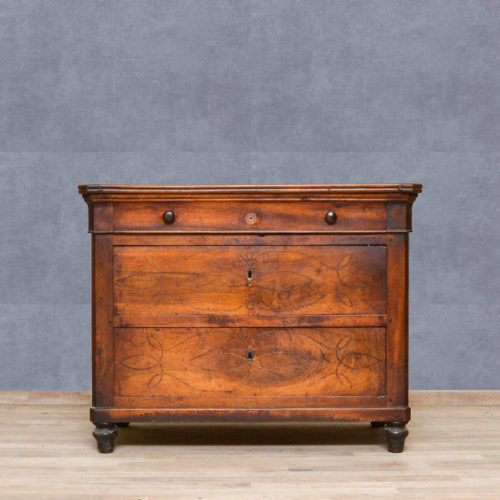 Small Piedmontese dresser in Luigi Filippo style. Two and a half drawers, turned foot, inlaid drawers in patina. In fair condition. Period: mid-19th century Measurements: H 84 x W 105 x D 54.5 cm
Small Piedmontese dresser in Luigi Filippo style. Two and a half drawers, turned foot, inlaid drawers in patina. In fair condition. Period: mid-19th century Measurements: H 84 x W 105 x D 54.5 cm -
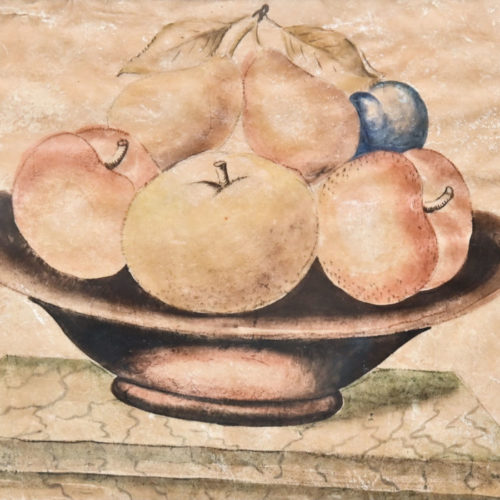 The painter Octavianus Monfort was known until 1990 only through a group of miniatures, signed and dated, depicting still lifes, which chronologically climbed between 1680 and 1689; and for a series of signed but undated miniatures, always depicting still lifes or, in some cases, sacred scenes. Period: 17th century Measurements: In frame H 28 x W 37.5 x D 2.5 / Parchment H23.5 x W 32.5 cm
The painter Octavianus Monfort was known until 1990 only through a group of miniatures, signed and dated, depicting still lifes, which chronologically climbed between 1680 and 1689; and for a series of signed but undated miniatures, always depicting still lifes or, in some cases, sacred scenes. Period: 17th century Measurements: In frame H 28 x W 37.5 x D 2.5 / Parchment H23.5 x W 32.5 cm
